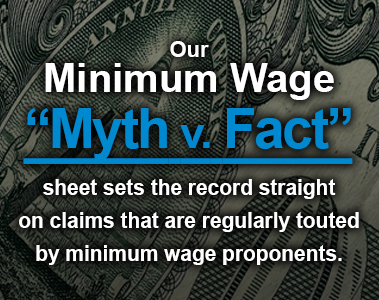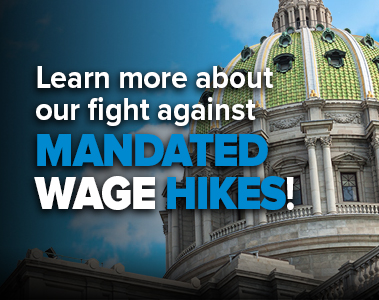At a Senate Democratic Policy Committee hearing this week, PA Chamber President Gene Barr cited findings from a number of nonpartisan studies and real-world stories from businesses that prove the disparaging impact of government-mandated minimum wage hikes on our economy, small business owners and low-wage earners.
 Committee lawmakers hosted the hearing as they kick off the 2021-22 session, but this is hardly the first year that some of them have announced their efforts to enact “feel good” minimum wage policies that, however well-intended they might be, are more harmful than helpful. The PA Chamber has long spoken out against minimum wage increases for a host of reasons, including:
Committee lawmakers hosted the hearing as they kick off the 2021-22 session, but this is hardly the first year that some of them have announced their efforts to enact “feel good” minimum wage policies that, however well-intended they might be, are more harmful than helpful. The PA Chamber has long spoken out against minimum wage increases for a host of reasons, including:
- State and federal nonpartisan offices – including the Congressional Budget Office – have shown that raising the minimum wage would lead to an estimated 1.3 million jobs lost, with that number possibly being as high as 3.7 million.
- The majority of minimum wage earners are under the age of 25 and live in households making more than $100,000 – disproving the often repeated claim that the majority of low-wage workers are holding down multiple jobs to make ends meet.
- The last time the federal minimum wage was increased (in 2007, 2008 and 2009), the country suffered through a debilitating recession and historically sluggish recovery.
Consequences from minimum wage hikes aren’t just reported in studies. We’ve heard anecdotally from our members for years about how these mandates prevent employers from investing in their workers and their facilities; have forced businesses to cut back hours; halted their hiring efforts and in some cases, even led to job loss. And while some companies will respond to mandated wage increases by investing in the automated technology that will replace their low-wage earners, other businesses without the financial means – think of the small business owner that makes $50,000 a year on average – will struggle to pay higher wages while maintaining the same staffing levels.
 Importantly, while the negative impacts of minimum wage increases are felt in a strong economy, the current economic climate, with all the challenges and uncertainties arising from the pandemic, would make a new wage mandate an even more difficult hurdle for employers to overcome.
Importantly, while the negative impacts of minimum wage increases are felt in a strong economy, the current economic climate, with all the challenges and uncertainties arising from the pandemic, would make a new wage mandate an even more difficult hurdle for employers to overcome.
As Barr told the policy committee, a fairer and more targeted approach to helping people in poverty would be to implement an Earned Income Tax Credit; along with strengthening workforce development programs that provide skills training to ensure upward mobility through the workforce.
Through skills training and helping to ensure equality of opportunity, we can build a better Pennsylvania for all of its citizens and create the Equality of Opportunity that is at the heart of our “Bringing PA Back” initiative.